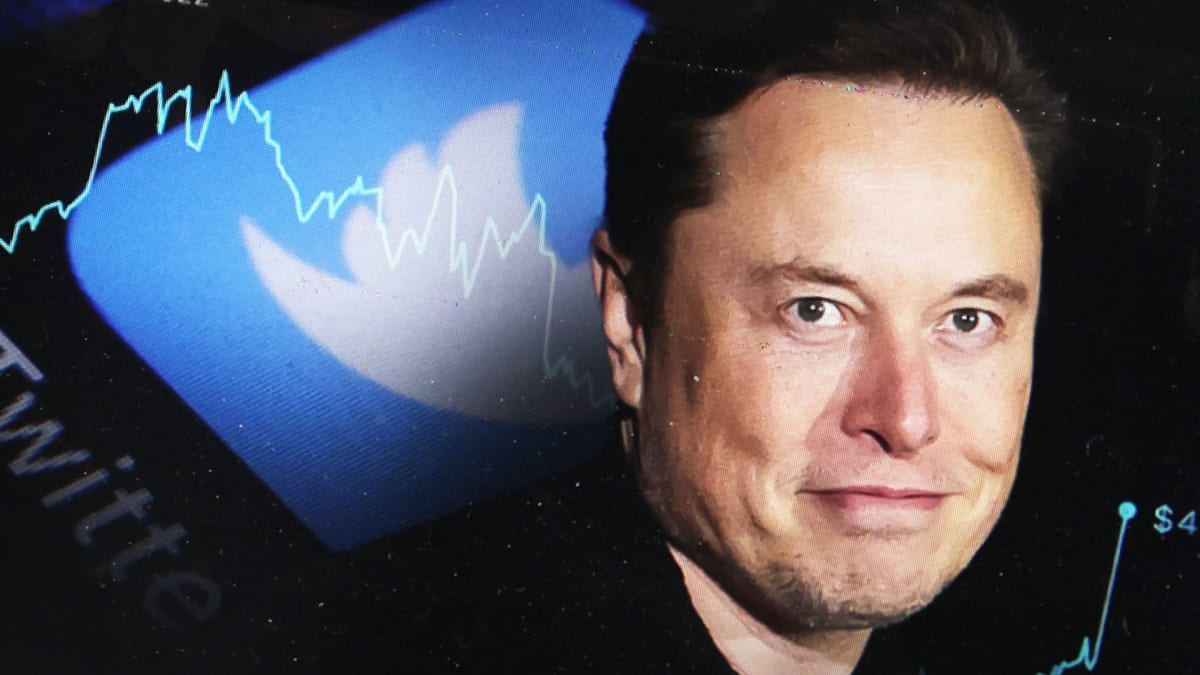
Elon Musk could be forgiven for feeling a touch of buyer's remorse over his $44 billion acquisition of Twitter.
The social media company's valuation has dropped by at least half and the appointment of a new CEO, Linda Yaccarino, who is a seasoned advertising executive, has not allayed many concerns.
DON'T MISS: The Value of Elon Musk's Twitter Plummets
In a Twitter Spaces on Monday, Musk admitted to the company's severe financial challenges. “Half of our advertising disappeared overnight because we’re insisting on free speech… they’re literally trying to drive Twitter bankrupt,” he said.
Advertising revenue accounted for over 91% of Twitter's revenue in the second quarter of 2022, the last period for which data are available.
But Musk fails to take responsibility for driving advertisers away. After he acquired the company in 2022, the billionaire not only slashed the company's headcount by a whopping 69%, he also reinstated accounts that Twitter had previously banned because they posted racist, anti-Semitic, hateful and misogynistic comments.
The company has allowed offensive tweets to remain, drawing ire from users of the platform.
Advertisers have extremely unhappy with the recent changes made to Twitter. They have fled in droves, fed up with the problems that multiplied after Musk took over the company.
The company's ad revenue continues to plummet. From April 1 to the first week of May, Twitter generated only $88 million in ad sales, a large decline of 59% from the same period in 2022, according to The New York Times.
Ad sales at Twitter each week often miss what executives have projected - the declines tally up to 30%, the NY Times said.
Both former and current employees at Twitter said they do not believe revenue will rise soon since advertisers may not like the increase of ads containing cannabis products and online gambling as well as more pornography and hate speech in tweets, according to the report.
The world's richest man took Twitter private by paying $44 billion, including $33.5 billion that was in equity. Some major shareholders of Twitter 1.0 helped him finance the acquisition by rolling their stakes into Twitter 2.0.
Before the acquisition last October, retirement provider Fidelity Investments held a stake equivalent to about $20 million in Twitter.
At the end of March, Musk acknowledged that Twitter's value had been more than halved. In effect, the tech mogul offered new equity grants to employees based on a $20 billion valuation.
But only a month later, Fidelity assessed this valuation at much less. Last November Fidelity had marked down its stake to $8.6 million. As of Jan. 31, the stake was valued at $7.8 million.
Fidelity continues to write down the value of its investment in Twitter, now known as X Holdings in official documents. As of April 28, Fidelity Blue Chip Growth Fund's stake in Twitter 2.0 is valued at just $6.55 million, according to a new filing.
Given this new move by Fidelity, Musk's Twitter valuation is now just $14.41 billion. Basically, the social media platform lost $29.6 billion in market value in seven months.
Employees Resigning Again
In an effort to slash costs, Musk drastically reduced Twitter's headcount last year. When Musk bought the social media company, Twitter had 7,500 employees. But within three months, 5,200 employees had their jobs eliminated.
He cut 50% of the jobs in one day last November.
A few days after these job cuts, Musk demanded that the remaining employees work long hours or quit.
"Going forward, to build a breakthrough Twitter 2.0 and succeed in an increasingly competitive world, we will need to be extremely hardcore. This will mean working long hours at high intensity. Only exceptional performance will constitute a passing grade," the billionaire wrote in an email sent to employees on Nov. 16.
Employees in critical roles left even before Yaccarino began her tenure on June 5.
A.J. Brown, the head of brand safety and ad quality at Twitter, plans to resign, a source said on June 2, according to Reuters and other media outlets. Her job was to prevent ads from loading next to content that would not be suitable.
Ella Irwin, a vice president of product for trust and safety, told Reuters on June 1 that she quit her job of moderating content and replying to Twitter users about accounts that were suspended.
Musk Allows Racist, Hateful Comments
Musk, who had never run a social media company before the acquisition, removed the safeguards limiting the spread of misinformation, racism and antisemitism as well as hateful content on Twitter.
His laissez-faire approach is part of Musk's defense of free speech. But his strategy has transformed Twitter into a bastion for conservatives, who come together to denounce what Musk has described as the "woke mind virus." This expression is a catch-all for progressive values.
After Musk became the CEO of Twitter, he faced controversy immediately as the number of racist comments spiked exponentially, including the use of the N-word.
Racists and trolls flooded Twitter, testing whether the CEO of Tesla would stand by his claim of being a "free speech absolutist."
The number of trolls using the N-word on Twitter rose by 500% within 12 hours after the $44 billion deal was finalized, according to a report by the Network Contagion Research Institute, a group which researches social media content to determine threats that could materialize.
Accounts tweeting hate speech ranging from slurs against Black people to anti-Semitism surged immediately on Oct. 27, the day before the billionaire took over Twitter.
Musk decided to allow former President Donald Trump back on the platform although he continues to use Truth Social, operated by his own company, Trump Media and Technology Group (TMTG). Digital World Acquisition Corp (DWAC), the blank check company has been attempting to merge with Trump's fledgling media group.







